Ethical Issues in Research: IVF, Informed Consent, and Confidentiality
VerifiedAdded on 2021/05/31
|6
|1330
|122
Report
AI Summary
This report delves into the ethical complexities of research, using the IVF procedure as a case study. It examines key ethical issues such as informed consent, confidentiality, and the protection of vulnerable populations. The report highlights the importance of beneficence, the need to avoid harm, and the researcher's competency in conducting ethical research. It further explores the use of survey questions to assess ethical codes in research, including considerations for deception, voluntary participation, and anonymity. The report emphasizes the significance of providing participants with full information, obtaining informed consent, and ensuring confidentiality. It also discusses the ethical concerns in the introductory survey statement, including the importance of respecting participants' autonomy and the need to clearly state the research's purpose and potential benefits. The report concludes by emphasizing the need for ethical frameworks to protect human rights and guide researchers.
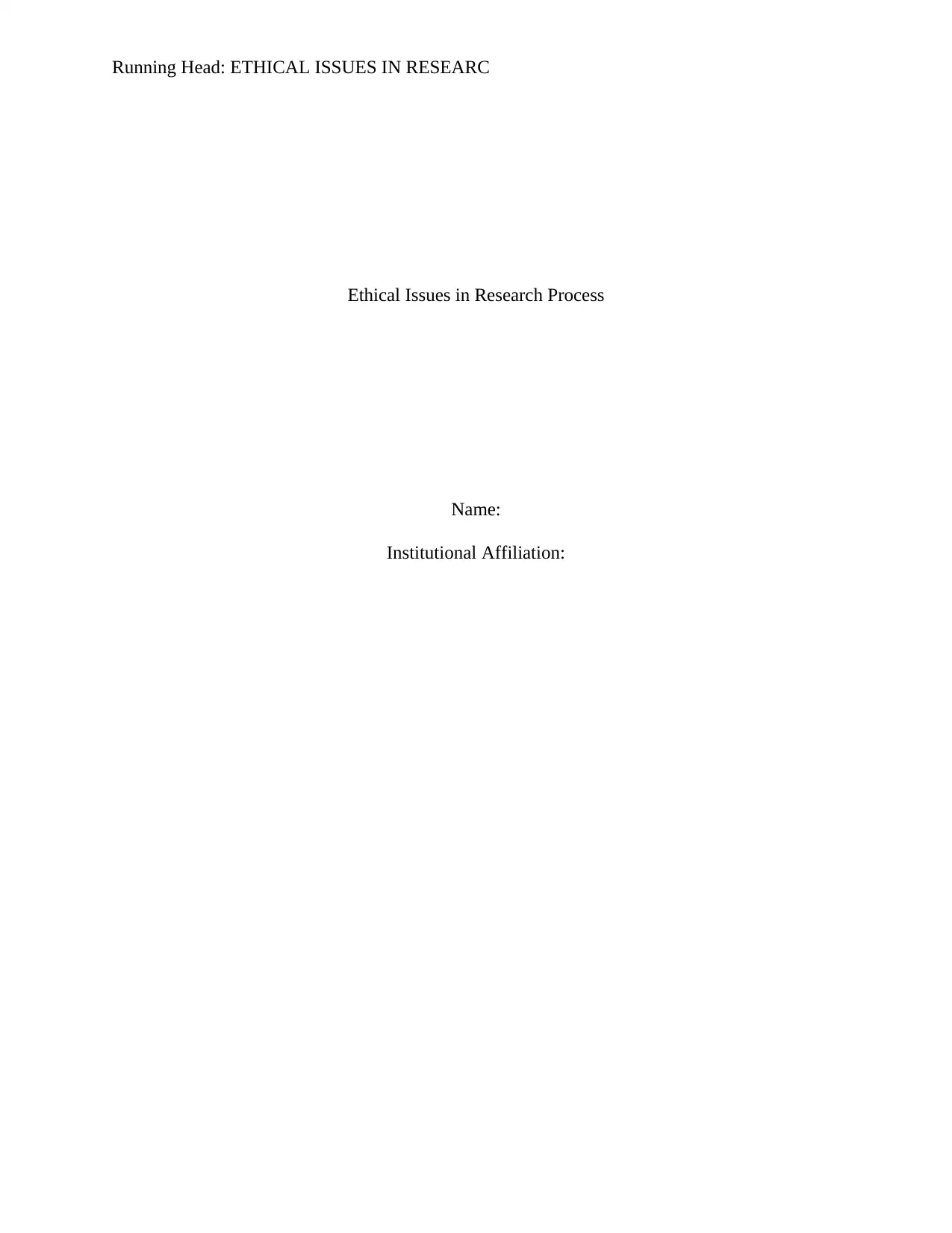
Running Head: ETHICAL ISSUES IN RESEARC
Ethical Issues in Research Process
Name:
Institutional Affiliation:
Ethical Issues in Research Process
Name:
Institutional Affiliation:
Paraphrase This Document
Need a fresh take? Get an instant paraphrase of this document with our AI Paraphraser
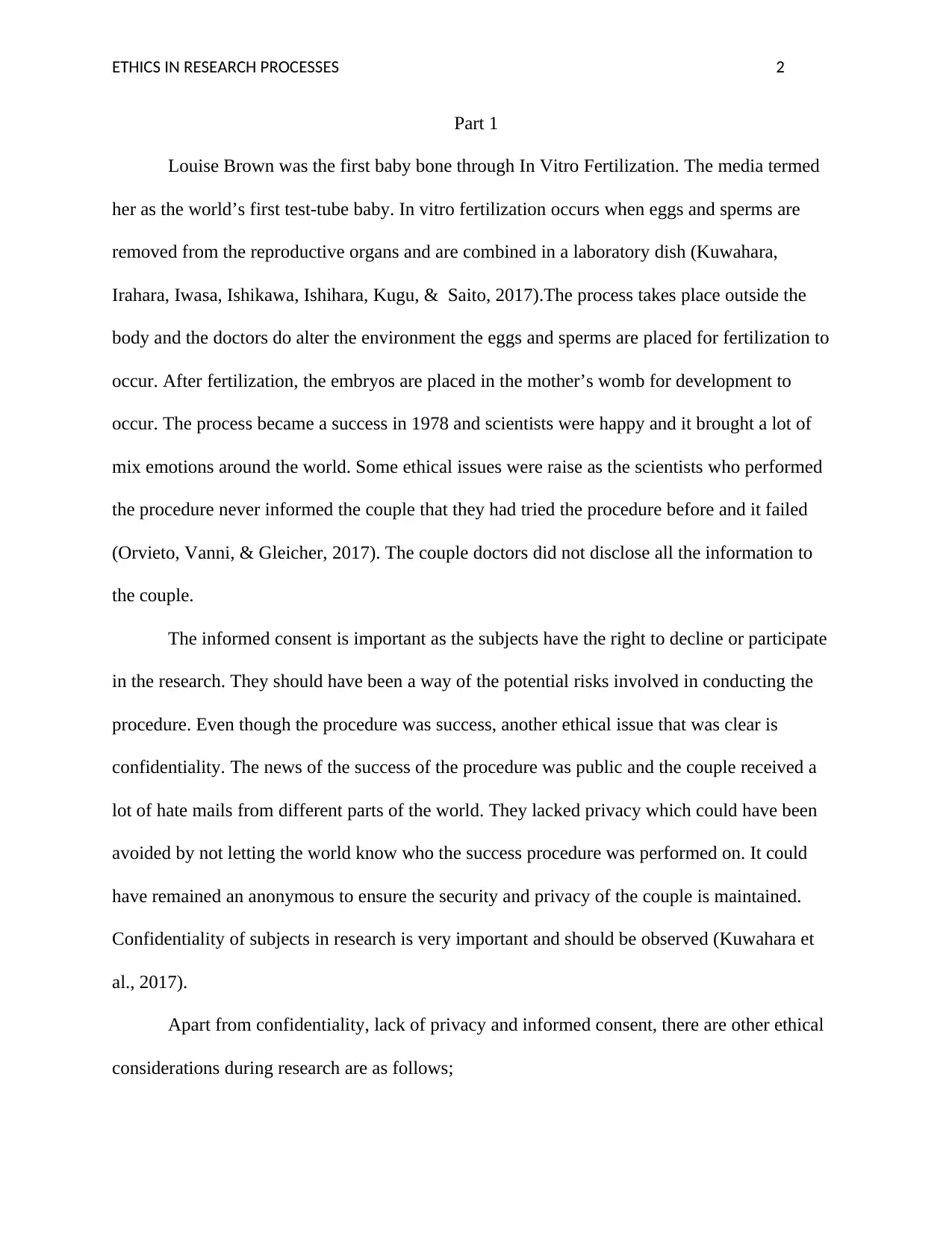
ETHICS IN RESEARCH PROCESSES 2
Part 1
Louise Brown was the first baby bone through In Vitro Fertilization. The media termed
her as the world’s first test-tube baby. In vitro fertilization occurs when eggs and sperms are
removed from the reproductive organs and are combined in a laboratory dish (Kuwahara,
Irahara, Iwasa, Ishikawa, Ishihara, Kugu, & Saito, 2017).The process takes place outside the
body and the doctors do alter the environment the eggs and sperms are placed for fertilization to
occur. After fertilization, the embryos are placed in the mother’s womb for development to
occur. The process became a success in 1978 and scientists were happy and it brought a lot of
mix emotions around the world. Some ethical issues were raise as the scientists who performed
the procedure never informed the couple that they had tried the procedure before and it failed
(Orvieto, Vanni, & Gleicher, 2017). The couple doctors did not disclose all the information to
the couple.
The informed consent is important as the subjects have the right to decline or participate
in the research. They should have been a way of the potential risks involved in conducting the
procedure. Even though the procedure was success, another ethical issue that was clear is
confidentiality. The news of the success of the procedure was public and the couple received a
lot of hate mails from different parts of the world. They lacked privacy which could have been
avoided by not letting the world know who the success procedure was performed on. It could
have remained an anonymous to ensure the security and privacy of the couple is maintained.
Confidentiality of subjects in research is very important and should be observed (Kuwahara et
al., 2017).
Apart from confidentiality, lack of privacy and informed consent, there are other ethical
considerations during research are as follows;
Part 1
Louise Brown was the first baby bone through In Vitro Fertilization. The media termed
her as the world’s first test-tube baby. In vitro fertilization occurs when eggs and sperms are
removed from the reproductive organs and are combined in a laboratory dish (Kuwahara,
Irahara, Iwasa, Ishikawa, Ishihara, Kugu, & Saito, 2017).The process takes place outside the
body and the doctors do alter the environment the eggs and sperms are placed for fertilization to
occur. After fertilization, the embryos are placed in the mother’s womb for development to
occur. The process became a success in 1978 and scientists were happy and it brought a lot of
mix emotions around the world. Some ethical issues were raise as the scientists who performed
the procedure never informed the couple that they had tried the procedure before and it failed
(Orvieto, Vanni, & Gleicher, 2017). The couple doctors did not disclose all the information to
the couple.
The informed consent is important as the subjects have the right to decline or participate
in the research. They should have been a way of the potential risks involved in conducting the
procedure. Even though the procedure was success, another ethical issue that was clear is
confidentiality. The news of the success of the procedure was public and the couple received a
lot of hate mails from different parts of the world. They lacked privacy which could have been
avoided by not letting the world know who the success procedure was performed on. It could
have remained an anonymous to ensure the security and privacy of the couple is maintained.
Confidentiality of subjects in research is very important and should be observed (Kuwahara et
al., 2017).
Apart from confidentiality, lack of privacy and informed consent, there are other ethical
considerations during research are as follows;
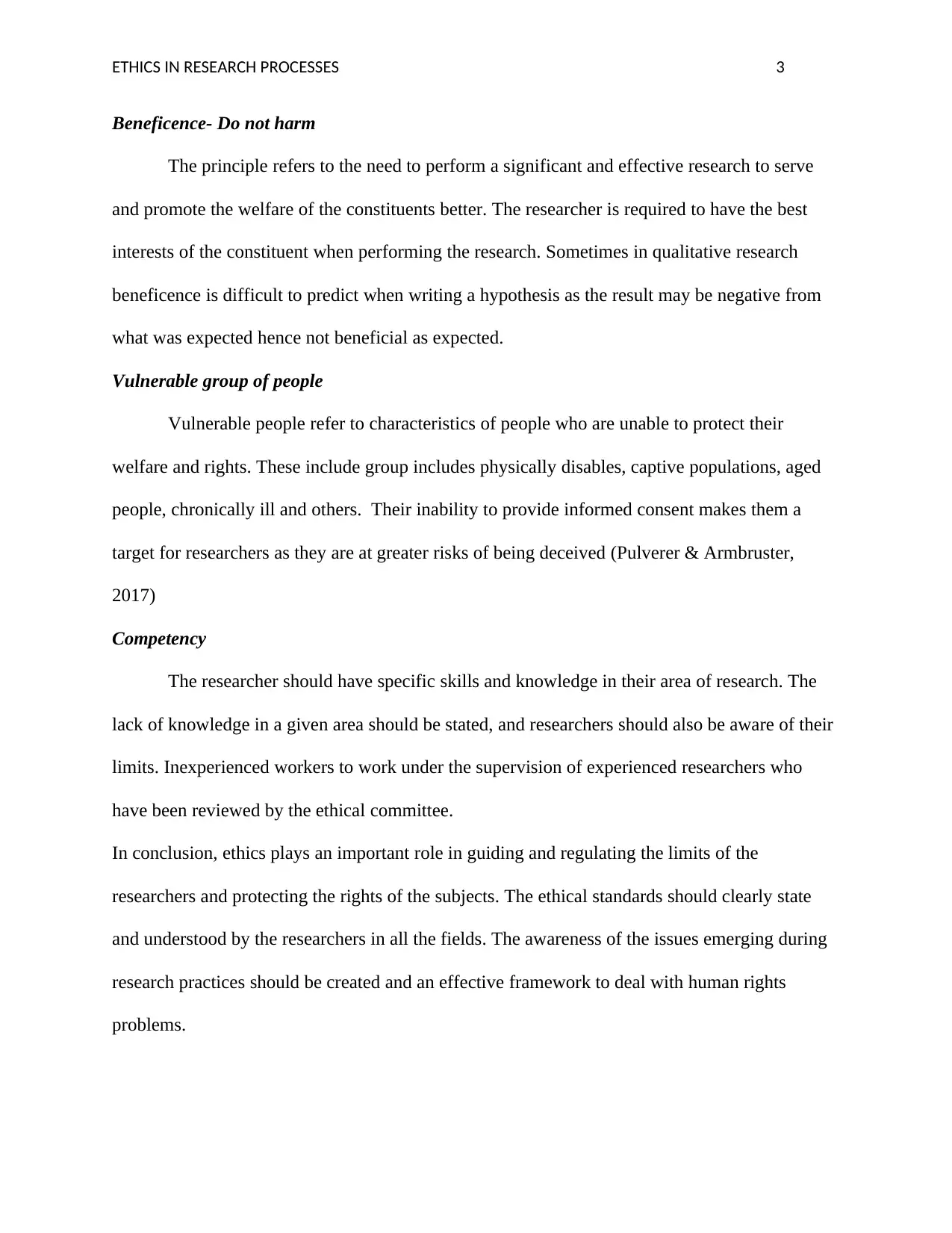
ETHICS IN RESEARCH PROCESSES 3
Beneficence- Do not harm
The principle refers to the need to perform a significant and effective research to serve
and promote the welfare of the constituents better. The researcher is required to have the best
interests of the constituent when performing the research. Sometimes in qualitative research
beneficence is difficult to predict when writing a hypothesis as the result may be negative from
what was expected hence not beneficial as expected.
Vulnerable group of people
Vulnerable people refer to characteristics of people who are unable to protect their
welfare and rights. These include group includes physically disables, captive populations, aged
people, chronically ill and others. Their inability to provide informed consent makes them a
target for researchers as they are at greater risks of being deceived (Pulverer & Armbruster,
2017)
Competency
The researcher should have specific skills and knowledge in their area of research. The
lack of knowledge in a given area should be stated, and researchers should also be aware of their
limits. Inexperienced workers to work under the supervision of experienced researchers who
have been reviewed by the ethical committee.
In conclusion, ethics plays an important role in guiding and regulating the limits of the
researchers and protecting the rights of the subjects. The ethical standards should clearly state
and understood by the researchers in all the fields. The awareness of the issues emerging during
research practices should be created and an effective framework to deal with human rights
problems.
Beneficence- Do not harm
The principle refers to the need to perform a significant and effective research to serve
and promote the welfare of the constituents better. The researcher is required to have the best
interests of the constituent when performing the research. Sometimes in qualitative research
beneficence is difficult to predict when writing a hypothesis as the result may be negative from
what was expected hence not beneficial as expected.
Vulnerable group of people
Vulnerable people refer to characteristics of people who are unable to protect their
welfare and rights. These include group includes physically disables, captive populations, aged
people, chronically ill and others. Their inability to provide informed consent makes them a
target for researchers as they are at greater risks of being deceived (Pulverer & Armbruster,
2017)
Competency
The researcher should have specific skills and knowledge in their area of research. The
lack of knowledge in a given area should be stated, and researchers should also be aware of their
limits. Inexperienced workers to work under the supervision of experienced researchers who
have been reviewed by the ethical committee.
In conclusion, ethics plays an important role in guiding and regulating the limits of the
researchers and protecting the rights of the subjects. The ethical standards should clearly state
and understood by the researchers in all the fields. The awareness of the issues emerging during
research practices should be created and an effective framework to deal with human rights
problems.
⊘ This is a preview!⊘
Do you want full access?
Subscribe today to unlock all pages.

Trusted by 1+ million students worldwide
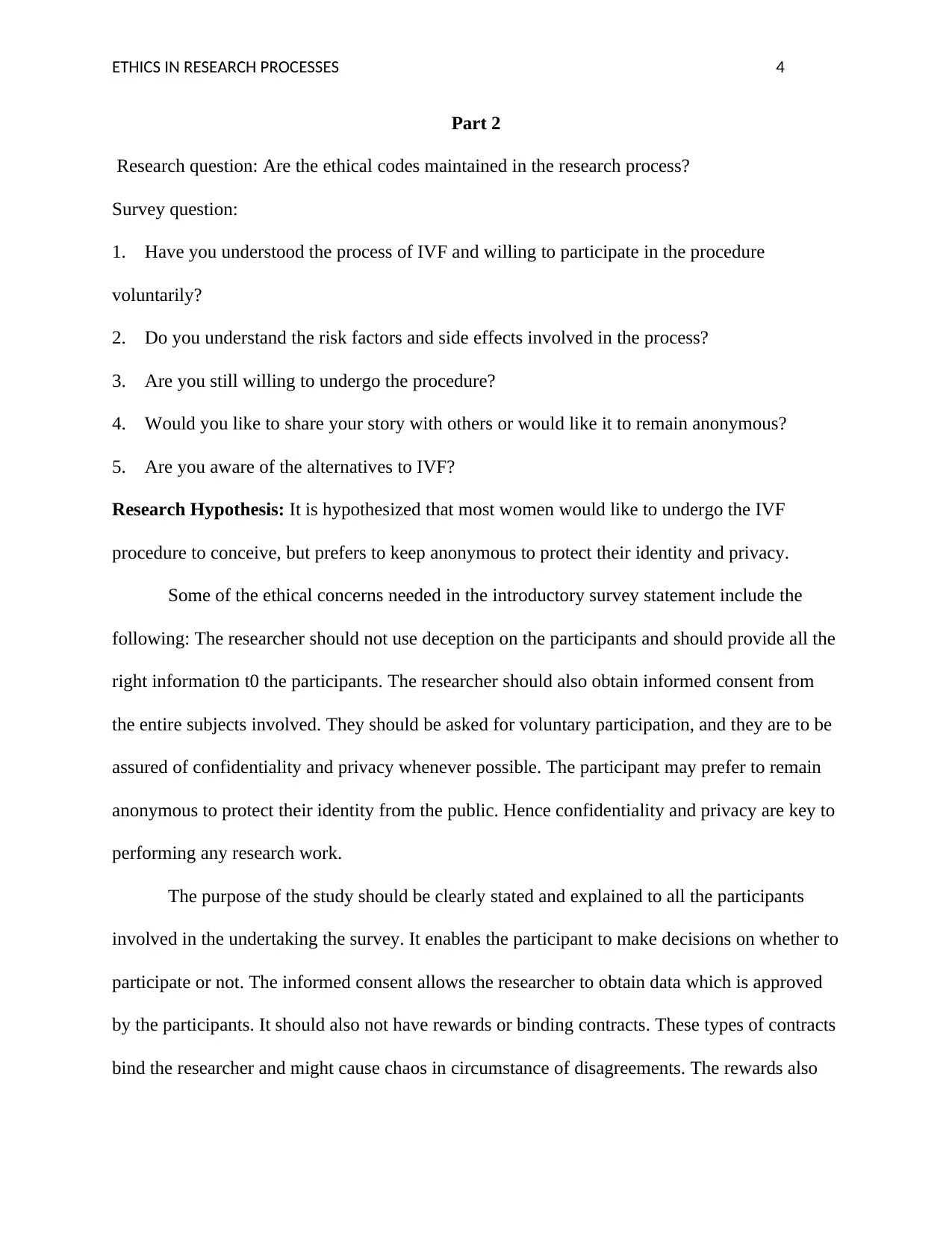
ETHICS IN RESEARCH PROCESSES 4
Part 2
Research question: Are the ethical codes maintained in the research process?
Survey question:
1. Have you understood the process of IVF and willing to participate in the procedure
voluntarily?
2. Do you understand the risk factors and side effects involved in the process?
3. Are you still willing to undergo the procedure?
4. Would you like to share your story with others or would like it to remain anonymous?
5. Are you aware of the alternatives to IVF?
Research Hypothesis: It is hypothesized that most women would like to undergo the IVF
procedure to conceive, but prefers to keep anonymous to protect their identity and privacy.
Some of the ethical concerns needed in the introductory survey statement include the
following: The researcher should not use deception on the participants and should provide all the
right information t0 the participants. The researcher should also obtain informed consent from
the entire subjects involved. They should be asked for voluntary participation, and they are to be
assured of confidentiality and privacy whenever possible. The participant may prefer to remain
anonymous to protect their identity from the public. Hence confidentiality and privacy are key to
performing any research work.
The purpose of the study should be clearly stated and explained to all the participants
involved in the undertaking the survey. It enables the participant to make decisions on whether to
participate or not. The informed consent allows the researcher to obtain data which is approved
by the participants. It should also not have rewards or binding contracts. These types of contracts
bind the researcher and might cause chaos in circumstance of disagreements. The rewards also
Part 2
Research question: Are the ethical codes maintained in the research process?
Survey question:
1. Have you understood the process of IVF and willing to participate in the procedure
voluntarily?
2. Do you understand the risk factors and side effects involved in the process?
3. Are you still willing to undergo the procedure?
4. Would you like to share your story with others or would like it to remain anonymous?
5. Are you aware of the alternatives to IVF?
Research Hypothesis: It is hypothesized that most women would like to undergo the IVF
procedure to conceive, but prefers to keep anonymous to protect their identity and privacy.
Some of the ethical concerns needed in the introductory survey statement include the
following: The researcher should not use deception on the participants and should provide all the
right information t0 the participants. The researcher should also obtain informed consent from
the entire subjects involved. They should be asked for voluntary participation, and they are to be
assured of confidentiality and privacy whenever possible. The participant may prefer to remain
anonymous to protect their identity from the public. Hence confidentiality and privacy are key to
performing any research work.
The purpose of the study should be clearly stated and explained to all the participants
involved in the undertaking the survey. It enables the participant to make decisions on whether to
participate or not. The informed consent allows the researcher to obtain data which is approved
by the participants. It should also not have rewards or binding contracts. These types of contracts
bind the researcher and might cause chaos in circumstance of disagreements. The rewards also
Paraphrase This Document
Need a fresh take? Get an instant paraphrase of this document with our AI Paraphraser
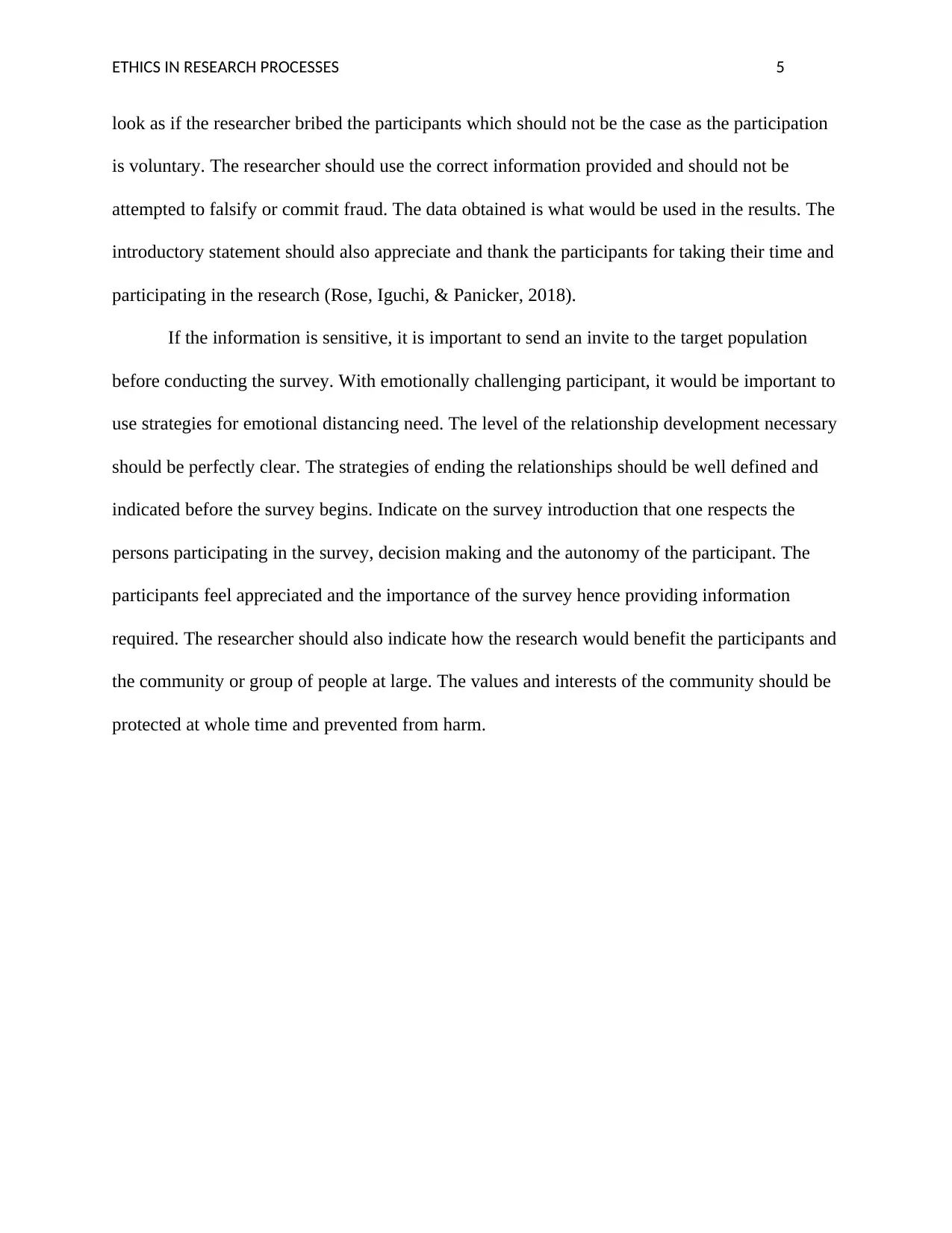
ETHICS IN RESEARCH PROCESSES 5
look as if the researcher bribed the participants which should not be the case as the participation
is voluntary. The researcher should use the correct information provided and should not be
attempted to falsify or commit fraud. The data obtained is what would be used in the results. The
introductory statement should also appreciate and thank the participants for taking their time and
participating in the research (Rose, Iguchi, & Panicker, 2018).
If the information is sensitive, it is important to send an invite to the target population
before conducting the survey. With emotionally challenging participant, it would be important to
use strategies for emotional distancing need. The level of the relationship development necessary
should be perfectly clear. The strategies of ending the relationships should be well defined and
indicated before the survey begins. Indicate on the survey introduction that one respects the
persons participating in the survey, decision making and the autonomy of the participant. The
participants feel appreciated and the importance of the survey hence providing information
required. The researcher should also indicate how the research would benefit the participants and
the community or group of people at large. The values and interests of the community should be
protected at whole time and prevented from harm.
look as if the researcher bribed the participants which should not be the case as the participation
is voluntary. The researcher should use the correct information provided and should not be
attempted to falsify or commit fraud. The data obtained is what would be used in the results. The
introductory statement should also appreciate and thank the participants for taking their time and
participating in the research (Rose, Iguchi, & Panicker, 2018).
If the information is sensitive, it is important to send an invite to the target population
before conducting the survey. With emotionally challenging participant, it would be important to
use strategies for emotional distancing need. The level of the relationship development necessary
should be perfectly clear. The strategies of ending the relationships should be well defined and
indicated before the survey begins. Indicate on the survey introduction that one respects the
persons participating in the survey, decision making and the autonomy of the participant. The
participants feel appreciated and the importance of the survey hence providing information
required. The researcher should also indicate how the research would benefit the participants and
the community or group of people at large. The values and interests of the community should be
protected at whole time and prevented from harm.
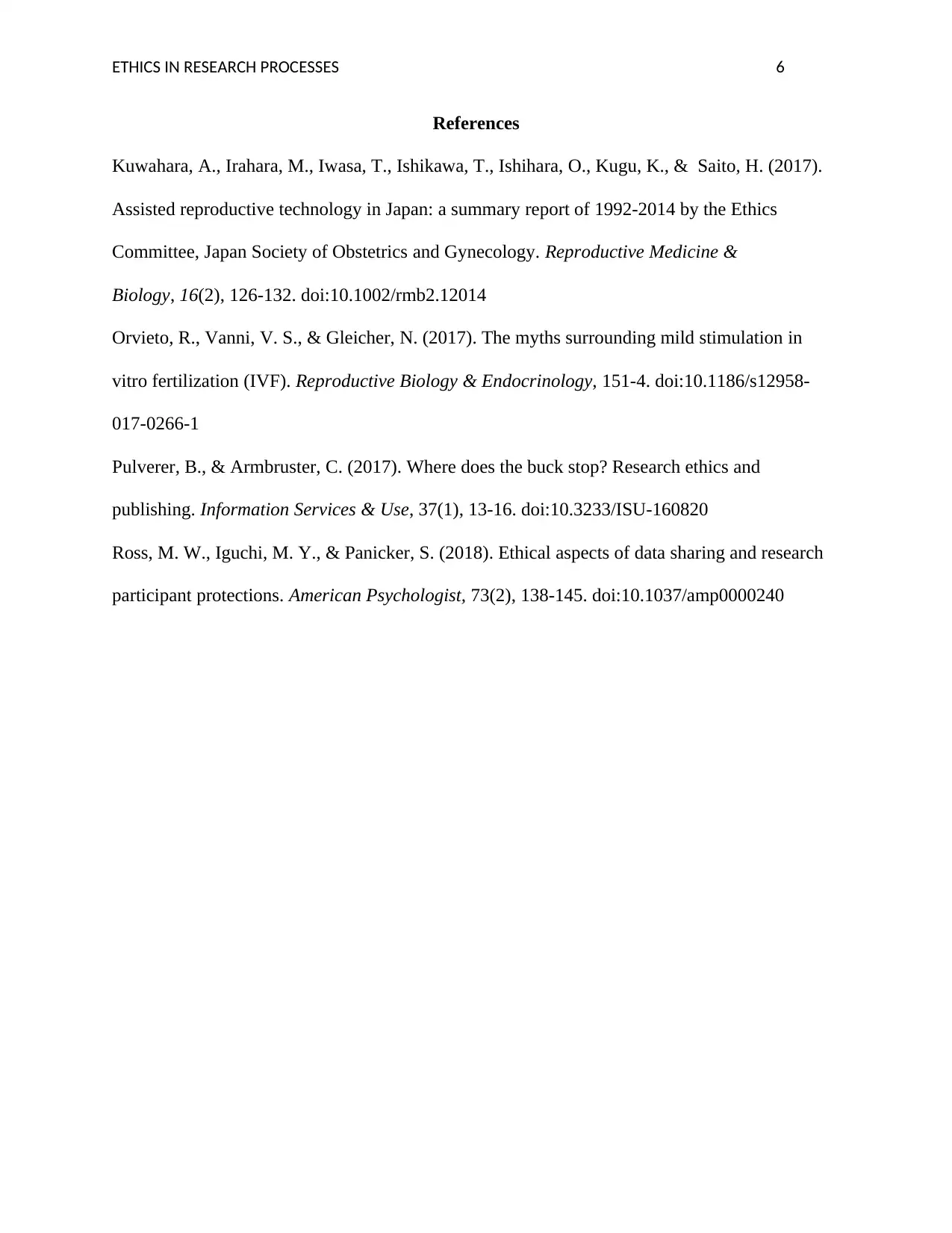
ETHICS IN RESEARCH PROCESSES 6
References
Kuwahara, A., Irahara, M., Iwasa, T., Ishikawa, T., Ishihara, O., Kugu, K., & Saito, H. (2017).
Assisted reproductive technology in Japan: a summary report of 1992-2014 by the Ethics
Committee, Japan Society of Obstetrics and Gynecology. Reproductive Medicine &
Biology, 16(2), 126-132. doi:10.1002/rmb2.12014
Orvieto, R., Vanni, V. S., & Gleicher, N. (2017). The myths surrounding mild stimulation in
vitro fertilization (IVF). Reproductive Biology & Endocrinology, 151-4. doi:10.1186/s12958-
017-0266-1
Pulverer, B., & Armbruster, C. (2017). Where does the buck stop? Research ethics and
publishing. Information Services & Use, 37(1), 13-16. doi:10.3233/ISU-160820
Ross, M. W., Iguchi, M. Y., & Panicker, S. (2018). Ethical aspects of data sharing and research
participant protections. American Psychologist, 73(2), 138-145. doi:10.1037/amp0000240
References
Kuwahara, A., Irahara, M., Iwasa, T., Ishikawa, T., Ishihara, O., Kugu, K., & Saito, H. (2017).
Assisted reproductive technology in Japan: a summary report of 1992-2014 by the Ethics
Committee, Japan Society of Obstetrics and Gynecology. Reproductive Medicine &
Biology, 16(2), 126-132. doi:10.1002/rmb2.12014
Orvieto, R., Vanni, V. S., & Gleicher, N. (2017). The myths surrounding mild stimulation in
vitro fertilization (IVF). Reproductive Biology & Endocrinology, 151-4. doi:10.1186/s12958-
017-0266-1
Pulverer, B., & Armbruster, C. (2017). Where does the buck stop? Research ethics and
publishing. Information Services & Use, 37(1), 13-16. doi:10.3233/ISU-160820
Ross, M. W., Iguchi, M. Y., & Panicker, S. (2018). Ethical aspects of data sharing and research
participant protections. American Psychologist, 73(2), 138-145. doi:10.1037/amp0000240
⊘ This is a preview!⊘
Do you want full access?
Subscribe today to unlock all pages.

Trusted by 1+ million students worldwide
1 out of 6
Your All-in-One AI-Powered Toolkit for Academic Success.
+13062052269
info@desklib.com
Available 24*7 on WhatsApp / Email
![[object Object]](/_next/static/media/star-bottom.7253800d.svg)
Unlock your academic potential
Copyright © 2020–2026 A2Z Services. All Rights Reserved. Developed and managed by ZUCOL.
